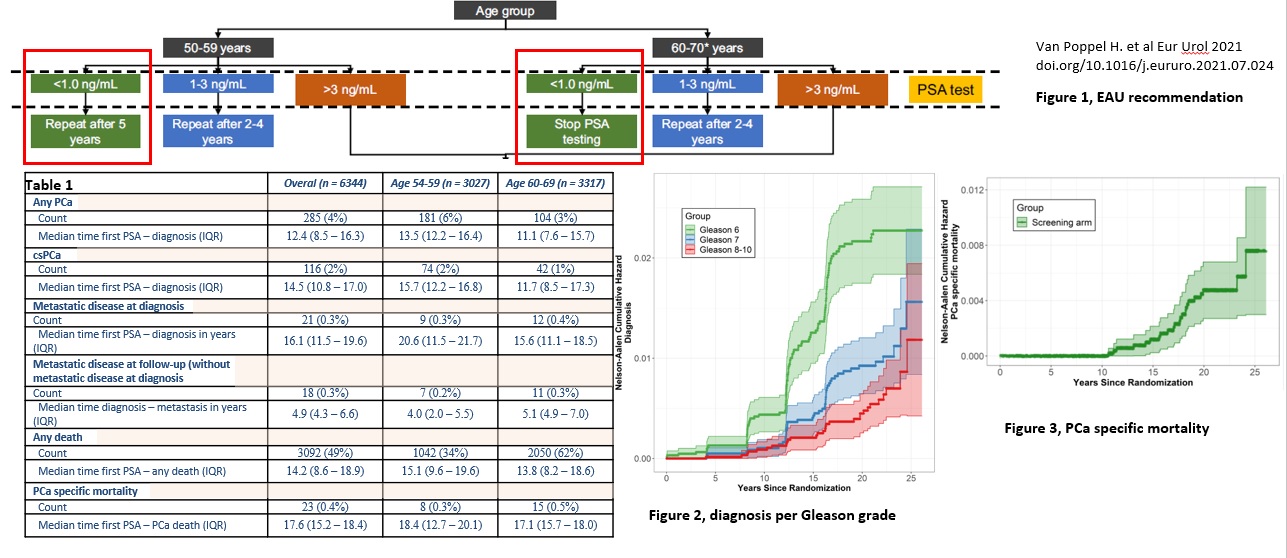Back
Poster, Podium & Video Sessions
Podium
PD11: Prostate Cancer: Detection & Screening II
PD11-06: Baseline PSA below 1.0 ng/ml, and then? Verification of the EAU 2021 Position and Recommendation on risk-adapted early detection using ERSPC Rotterdam data with more than 20 years of detailed follow-up.
Friday, May 13, 2022
1:50 PM – 2:00 PM
Location: Room 245
Monique Roobol, Sebastiaan Remmers, Renée Hogenhout*, Ivo de Vos, ERSPC Rotterdam study group, Rotterdam, Netherlands

Renee Hogenhout, MSC
PhD candidate
Erasmus MC Cancer Institute
Podium Presenter(s)
Introduction: The ERSPC and other population-based prostate cancer (PCa) trials show unambiguously that a baseline PSA is indicative for the risk of developing (life-threatening) PCa in the decade(s) to come. This has important implications for further testing and it is therefore that most guidelines now recommend a follow-up algorithm based on baseline PSA. The recently published EAU 2021 Position paper suggests in men with low baseline PSA, to apply a 5-year retesting interval or stopping rule for different age groups (fig 1). Here we validate these recommendations on ERSPC Rotterdam data with a detailed follow-up of 20-26 years after baseline PSA.
Methods: A total of 16,586 men, aged 55-69 years, were randomized to a 4-year screening protocol in the period 1993-1999. We collected and analyzed detailed incidence and mortality data up to 01-01-2020 of those men that had a baseline PSA of <1.0 ng/ml aged 54-59 (A) and 60-69 yr (B).
Results: Of the 16,586 men randomized, 6344 men (38%) had a baseline PSA <1.0 ng/ml (3027 in group A and 3317 in group B). A total of 285 (4.5%) men were diagnosed with PCa (6.0% in A and 3.1% in B), after a median follow-up of 13.5 yr (A) and 11.1 yr (B; tab 1). In both groups the time from initial PSA to a diagnosis of csPCa was 2-3 times longer than the proposed re-screening interval of 5 yr. Data on PCa grading showed that most detected PCa are Gleason 6 PCa (fig 2). In total, 21 PCa cases (0.3%) were M+ at time of diagnosis which occurred more than 15 yrs after baseline PSA. 18 PCa progressed to M+ disease (6.3% of all PCa) 5 yr after diagnosis. M+ disease is more common in group B (22% of all PCa, group A 8.8%). With a median FU of 21 yr, 34.4% of men in A and 61.8% in B have died. PCa mortality is rare; 0.26% in A and 0.45% in B. Diagnoses, progression and death occur at least 10-15 yr after baseline PSA (tab 1, fig 3).
Conclusions: Although there is a possibility for men aged >54 yr and a baseline PSA level <1.0 ng/ml to be confronted with a diagnosis, to suffer from M+ disease and to die from PCa, the risk is very low within a time frame of 2 decades. The recommended 5 year interval for retesting or even stopping screening in elderly men seems justified when taking into account the considerable harm that coincides with repeated screenings at an elderly age.
Source of Funding: none

Methods: A total of 16,586 men, aged 55-69 years, were randomized to a 4-year screening protocol in the period 1993-1999. We collected and analyzed detailed incidence and mortality data up to 01-01-2020 of those men that had a baseline PSA of <1.0 ng/ml aged 54-59 (A) and 60-69 yr (B).
Results: Of the 16,586 men randomized, 6344 men (38%) had a baseline PSA <1.0 ng/ml (3027 in group A and 3317 in group B). A total of 285 (4.5%) men were diagnosed with PCa (6.0% in A and 3.1% in B), after a median follow-up of 13.5 yr (A) and 11.1 yr (B; tab 1). In both groups the time from initial PSA to a diagnosis of csPCa was 2-3 times longer than the proposed re-screening interval of 5 yr. Data on PCa grading showed that most detected PCa are Gleason 6 PCa (fig 2). In total, 21 PCa cases (0.3%) were M+ at time of diagnosis which occurred more than 15 yrs after baseline PSA. 18 PCa progressed to M+ disease (6.3% of all PCa) 5 yr after diagnosis. M+ disease is more common in group B (22% of all PCa, group A 8.8%). With a median FU of 21 yr, 34.4% of men in A and 61.8% in B have died. PCa mortality is rare; 0.26% in A and 0.45% in B. Diagnoses, progression and death occur at least 10-15 yr after baseline PSA (tab 1, fig 3).
Conclusions: Although there is a possibility for men aged >54 yr and a baseline PSA level <1.0 ng/ml to be confronted with a diagnosis, to suffer from M+ disease and to die from PCa, the risk is very low within a time frame of 2 decades. The recommended 5 year interval for retesting or even stopping screening in elderly men seems justified when taking into account the considerable harm that coincides with repeated screenings at an elderly age.
Source of Funding: none


.jpg)
.jpg)